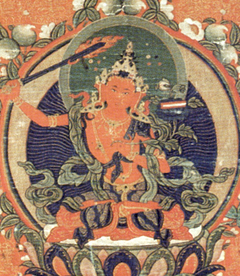Bhikṣuṇī Fa Kong of Wutai Shan
Bhikṣuṇī Fa Kong of Wutai Shan
from the Ḍākinīs' Great Dharma Treasury
Around the middle of the Tang Dynasty (618–907), there was a bhikṣuṇī named Fa Kong. Immersed in a state of overwhelming devotion, she constantly paid homage to the Buddha. Her family, the Fa Gong, was of Han heritage, and they came from a place called Jianzhou,[1] which is in contemporary Anhui Province.
At a young age, she felt immense faith in the Three Jewels, and, still in her youth, she left her family and friends to travel to Chan'an Monastery,[2] where she took novice and eventually full ordination. This monastery was located approximately 100 kilometers southwest of Wutai Shan. Along the way, she endured hundreds of hardships.
There, for forty or fifty years, she continually recited the Lotus Sūtra and acted with great probity, guarding her Vinaya vows as if they were her own eyes. Despite all this, when she examined herself, she still found obscurations. Although she understood all the meanings of the Lotus Sūtra she recited, she realized that she was not putting them into practice properly.
She then heard about a bhikṣu named Ta Tsa[3] from Ha Yen Monastery[4] at Wutai Shan who, for twenty years, had practiced austerities for the sake of the Dharma. She heard that at one point he was close to death, when suddenly many sublime omens arose. Without leaving his body,[5] he journeyed to Tuṣiṭa pure land where he met the Regent, Maitreya, face-to-face. Maitreya said to him,
Back in the human realm, you didn’t accomplish any notable virtues. You really have no business being here. It is only through the power of Ārya Mañjuśrī’s aspirations that you got here. Therefore, you must return to the human realm and celebrate the qualities of Ārya Mañjuśrī.
When Bhikṣuṇī Fa Kong heard that this man was living at Wutai Shan, she decided to go to Ha Yen Monastery with her younger sister, who had also taken monastic vows a month earlier. As they traveled, she prayed to Ārya Mañjuśrī one-pointedly, and in 809, she and her sister arrived at Wutai Shan, where they did a pilgrimage circuit.
In a grove containing three water fountains on the northwest side of Ha Yen Monastery, they met an old man who said to Fa Kong, “It is very good what you are doing; this place is very good. Stay here and practice, and you will definitely reach fruition.” He then disappeared.
She recognized the old man as Ārya Mañjuśrī and wept with intense devotion. Under the influence of Ārya Mañjuśrī’s compassion, she felt immeasurable compassion for all beings. Fueled by this compassion, all of her toxic deeds and obscurations were purified, and her body and mind were filled with bliss.
At that site, she built a small grass hut and contented herself with the barest necessities of life, practicing assiduously day and night.
On the twenty-fifth day of the twelfth month of 813, she gave away her robes and whatever possessions she had and said to her students,
My whole life, I recited the Lotus Sūtra, but now I have realized its meaning. Now it is time for me to go to the pure land. As for you all, please do not waste the freedoms and advantages of your lives; commit yourself to what is good.
Her students replied, “Dear guru, you are still in good health; why do you talk like this?”
Without responding, she crossed her legs, straightened her spine, and passed away. When they cremated her, her students found more than a thousand relics in her remains, which caused their faith in her to swell.
This story was translated to Tibetan from Chinese sources by Khenmo Dawa Drolma.
| Translated by Joseph McClellan, 2025.
Bibliography
Tibetan Source
mkhan mo zla ba srol ma. "nas mchog ri bo rtse lnga'i dge slong ma hpa khong." In mkha' gro chos mdzod chen mo, vol. 8, Bod ljongs bod yig dpe rnying dpe skrun khang, 2017, pp. 311–313. BDRC MW3CN2459_659029.
Version: 1.1-20250908
-
byan gros—This transliteration is tentative, as we are unable to identify this place. ↩
-
can an dgon ↩
-
ta tsha ↩
-
dpa' yen—This would normally be pronounced Pa Yen; however, below, what seems to be the same monastery is spelled ha yen. In the Golok-Serta region of Larung Gar, where Khenmo Dawa Drolma lived, the letters pa and pha are often pronounced closer to ha or hua. ↩
-
"Without leaving his body" is a literal translation of lus ma spangs par. This likely indicates that he did not exhibit the signs of death, such as the cessation of pulse and breath, which typically happen to revenants or deloks, who are thought to temporarily leave their bodies to visit the bardos and other realms. ↩
